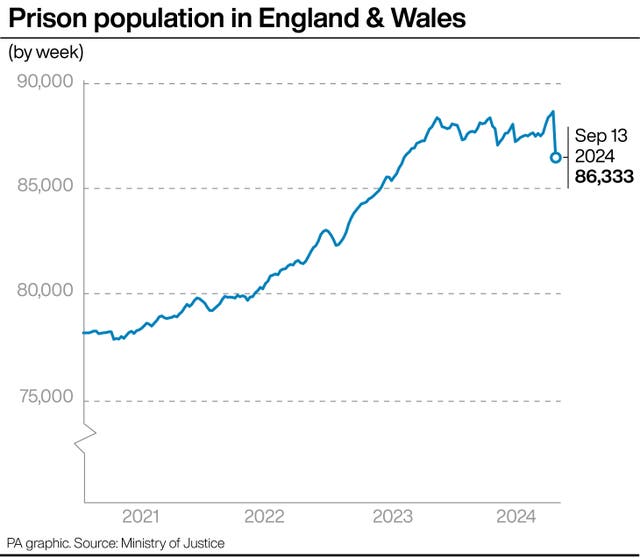The adult prison population dropped by more than 2,000 in the week the Government freed hundreds of inmates early.
Ministry of Justice (MoJ) figures showed there were 86,333 prisoners behind bars in England and Wales on Friday.
This is 2,188 fewer than the 88,521 recorded at the end of last week, when the number of inmates being held hit another new record high amid the jail overcrowding crisis, indicating the population fell by 2% within the seven-day period.

The Government said around 1,750 prisoners were freed early on Tuesday from jails across the two nations, suggesting a further 438 people also left under standard release terms.
The drop means the operational capacity for English and Welsh men and women’s prisons is 89,552, indicating there is now cell space for 3,219 criminals.
Separate figures also published on Friday illustrate how almost every prison in England and Wales only had a handful of spaces free at the end of last month, with some completely full or even over-capacity.
According to MoJ data recorded on August 30, Leyhill category D jail in Gloucestershire had a population of 460 which was the same size as its operational capacity, while category C prisons The Verne in Dorset reported a population of 610 while its capacity was 608.
An additional 1,350 cell spaces tend to always be kept free above the overall operational capacity of the prison estate in England and Wales as a contingency measure so jails can cope with a sudden influx of inmates or change in the make-up of the prison population, according to the MoJ.
On Wednesday Prime Minister Sir Keir Starmer defended freeing criminals, including some convicted killers, early from prison as he angrily blamed previous government inaction for forcing him into taking urgent steps to tackle the problem.
This week’s mass exodus marked the policy – announced by Justice Secretary Shabana Mahmood in July – coming into force and sees the proportion of sentences which some inmates must serve behind bars temporarily cut from 50% to 40% amid Government warnings jails were being pushed to the “point of collapse”.
Pictures emerged of an inmate being sprayed with bubbly by friends at the prison gates as they were released while ministers faced accusations that serious career criminals were among those walking free when the policy was launched.
Criminals serving prison sentences of less than four years for violent offences, including manslaughter, are among those eligible to be freed under the scheme.

Despite Government efforts to prevent domestic abusers from leaving prison early, the restrictions will not apply to all criminals with a history of such violence as the policy only excludes particular offences such as stalking.
Attackers convicted of other crimes such as threats to kill or actual bodily harm could still qualify for early release.
Rioters involved in this summer’s unrest are also not specifically excluded from early release. They will only stay behind bars for longer if they are serving more than four years for a violent offence.
But terrorists and sex offenders are excluded and will not be freed early.
Prisons watchdog Charlie Taylor warned it was “inevitable” some prisoners released early would reoffend and end up back behind bars under the “risky” scheme.
MPs were told some of the prisoners who find themselves homeless on release could be temporarily placed in taxpayer-funded budget hotels if there is not enough space in bail hostels and other community accommodation typically used for offenders.
The Government said it will review the changes after 18 months.




Why are you making commenting on The National only available to subscribers?
We know there are thousands of National readers who want to debate, argue and go back and forth in the comments section of our stories. We’ve got the most informed readers in Scotland, asking each other the big questions about the future of our country.
Unfortunately, though, these important debates are being spoiled by a vocal minority of trolls who aren’t really interested in the issues, try to derail the conversations, register under fake names, and post vile abuse.
So that’s why we’ve decided to make the ability to comment only available to our paying subscribers. That way, all the trolls who post abuse on our website will have to pay if they want to join the debate – and risk a permanent ban from the account that they subscribe with.
The conversation will go back to what it should be about – people who care passionately about the issues, but disagree constructively on what we should do about them. Let’s get that debate started!
Callum Baird, Editor of The National
Comments: Our rules
We want our comments to be a lively and valuable part of our community - a place where readers can debate and engage with the most important local issues. The ability to comment on our stories is a privilege, not a right, however, and that privilege may be withdrawn if it is abused or misused.
Please report any comments that break our rules.
Read the rules hereLast Updated:
Report this comment Cancel